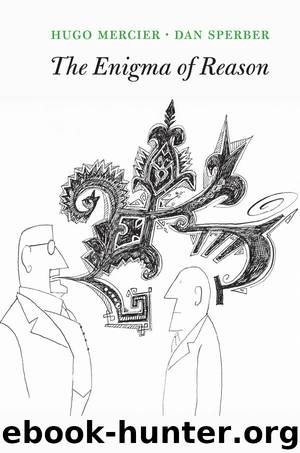The Enigma of Reason by Mercier Hugo

Author:Mercier, Hugo
Language: eng
Format: epub
Publisher: Harvard University Press
Published: 2017-04-17T00:00:00+00:00
Is Bias Always Bad?
How should cognitive mechanisms in general go about producing sound beliefs? Part of the answer, it seems, is that they should be free of bias. Biases have a bad press, in part because a common definition is “inclination or prejudice for or against one person or group, especially in a way considered to be unfair.”13 However, psychologists often use the term in a different manner, to mean a systematic tendency to commit some specific kind of mistakes. These mistakes need not have any moral, social, or political overtones.
A first kind of bias simply stems from the processing costs of cognition. Costs can be reduced by using heuristics, that is, cognitive shortcuts that are generally reliable but that in some cases lead to error. A good example of this is the “availability heuristic” studied by Tversky and Kahneman.14 It consists in using the ease with which an event comes to mind to guess its actual frequency. For instance, in one experiment participants were asked whether the letter R occurs more frequently in first or third position in English words. Most people answered that R occurs more often in first position, when actually it occurs more often in third position. The heuristic the participants used was to try to recall words beginning with R (like “river”) and words with R in the third place (like “bored”) and assume that the ease with which the two kinds of words came to mind reflected their actual frequency. In the particular case of the letter R (and of seven other consonants of the English alphabet), the availability heuristic happens to be misleading. In the case of the other thirteen consonants of the English alphabet, the same heuristic would give the right answer.
Although the availability heuristic can be described as biased—it does lead to systematic errors—its usefulness is clear when one considers the alternative: trying to count all the words one knows that have R as the first or third letter. While the heuristic can be made to look bad, we would be much more worried about a participant who would engage in this painstaking process just to answer a psychology quiz. Moreover, the psychologist Gerd Gigerenzer and his colleagues have shown that in many cases using such heuristics not only is less effortful but also gives better results than using more complex strategies.15 Heuristics, Gigerenzer argues, are not “quick-and-dirty”; they are “fast-and-frugal” ways of thinking that are remarkably reliable.
The second type of bias arises because not all errors are created equal.16 More effort should be made to avoid severely detrimental errors—and less effort to avoid relatively innocuous mistakes.
Here is a simple example illustrating how an imbalance in the cost of mistakes can give rise to adaptive biases. Bumblebees have cognitive mechanisms aimed at avoiding predators. Among their predators are crab spiders, small arachnids that catch the bees when they forage for nectar. Some crab spiders camouflage themselves by adopting the color of the flowers they rest on: they are cryptic. To learn
Download
This site does not store any files on its server. We only index and link to content provided by other sites. Please contact the content providers to delete copyright contents if any and email us, we'll remove relevant links or contents immediately.
The Art of Thinking Clearly by Rolf Dobelli(8850)
Mindhunter: Inside the FBI's Elite Serial Crime Unit by John E. Douglas & Mark Olshaker(7838)
Change Your Questions, Change Your Life by Marilee Adams(6647)
Nudge - Improving Decisions about Health, Wealth, and Happiness by Thaler Sunstein(6636)
Mastermind: How to Think Like Sherlock Holmes by Maria Konnikova(6239)
The Power of Now: A Guide to Spiritual Enlightenment by Eckhart Tolle(4757)
Men In Love by Nancy Friday(4331)
Factfulness: Ten Reasons We're Wrong About the World – and Why Things Are Better Than You Think by Hans Rosling(4024)
The Confidence Code by Katty Kay(3569)
Thinking in Bets by Annie Duke(3535)
Man and His Symbols by Carl Gustav Jung(3320)
Three Women by Lisa Taddeo(2922)
The Worm at the Core by Sheldon Solomon(2921)
Why Buddhism is True by Robert Wright(2829)
Liar's Poker by Michael Lewis(2814)
The Inner Life of Animals by Peter Wohlleben(2772)
Descartes' Error by Antonio Damasio(2735)
The Power of Mindful Learning by Ellen J. Langer(2712)
The Slow Fix: Solve Problems, Work Smarter, and Live Better In a World Addicted to Speed by Carl Honore(2575)
